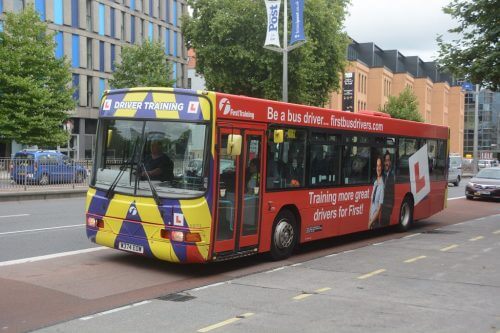
Paul Stratford is Recruitment and Training Manager at First West of England while Lukasz Linka is Relief Driver Trainer and Journey Maker Champion. As a prelude to CBW’s Superfeature on First West of England next week, Andy Izatt talks to them about how First goes about training its drivers
If you have a car licence and would like to drive a bus for a living, First West of England aims to have you qualified within 15 working days. The training school at its Lawrence Hill, Bristol’s head office is a finely tuned operation, but while it understands the importance of efficiency, it also prides itself in looking after the people it recruits to give them the best chance to succeed in their new career.
“We recently held a community engagement open day in Lawrence Hill where 100 visitors drove a bus,” explained First West of England Recruitment and Training Manager, Paul Stratford. “We’re holding recruitment days regularly. We want to meet as many people as we can to get the message across that there are numerous benefits in working for a company of this size. It’s not just about being paid to drive a bus. There are discounts in high street shops and reduced rail tickets on the local network available, to name a few. Uniforms are provided and there’s a pension at the end of it. There aren’t many jobs that can be for life, but we aim to offer that.
“Due to continued growth during the 2016-17 financial year, we introduced 300 new drivers. Of those, 207 were provisional category D licence holders. Whilst there are advantages to recruiting people who already have a licence to drive the bus, the benefit of provisional licence holders is that we can train them to the highest standard – one who first and foremost sees the job as a community service and customer focused role. So, we’re able to teach them our way of doing things from day one. So far, this year we have had 265 new starters of which 186 have been provisional licence holders.[…]
By subscribing you will benefit from:
- Operator & Supplier Profiles
- Face-to-Face Interviews
- Lastest News
- Test Drives and Reviews
- Legal Updates
- Route Focus
- Industry Insider Opinions
- Passenger Perspective
- Vehicle Launches
- and much more!


